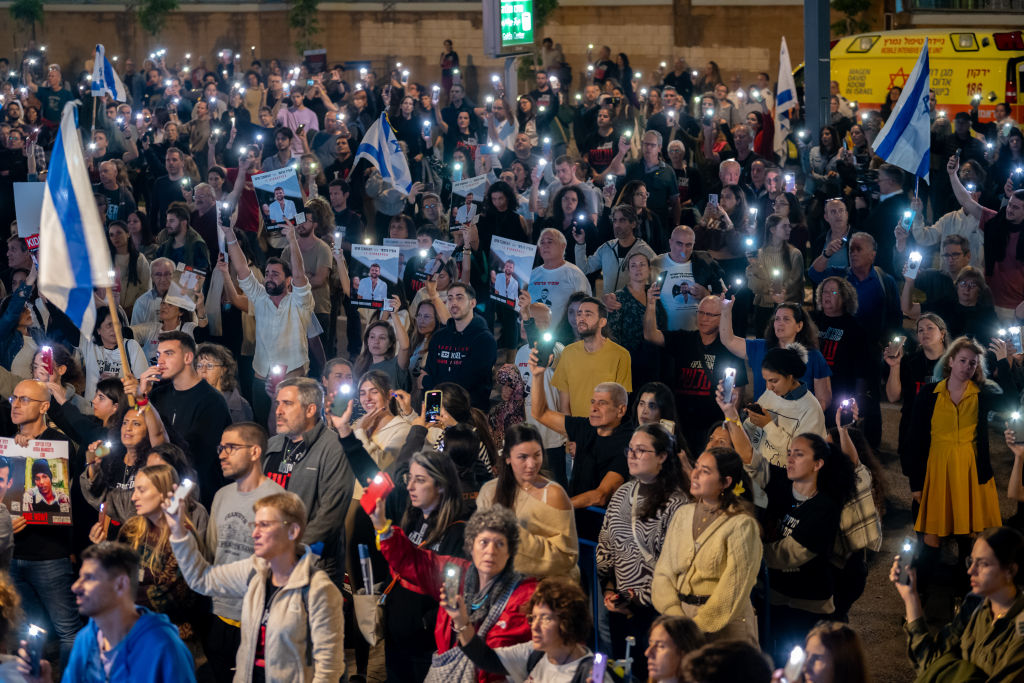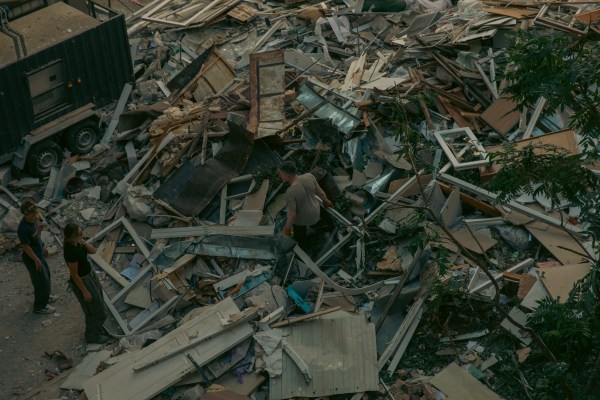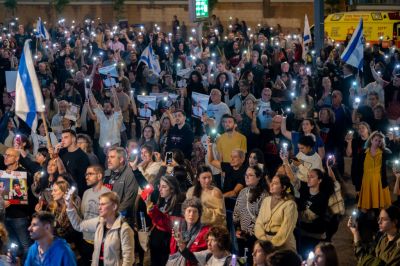Happy Monday! With Thanksgiving now behind us, it’s officially safe to put up those holiday decorations—but we doubt you’ll be able to top these guys.
Quick Hits: Today’s Top Stories
- Israel and Hamas reached a deal last week that included a pause in fighting in addition to the exchange of Palestinian women and minors held in Israeli prisons on charges or convictions of violent crimes for civilians kidnapped from Israel by Hamas during the terrorist group’s October 7 attack. The agreement specified that Israel would release 150 prisoners, Hamas would release 50 Israeli hostages, and Israel would allow 200 trucks of humanitarian aid into Gaza each day. The four-day ceasefire began on Friday and is slated to last through today. So far 39 Israeli hostages have been released by Hamas since Friday in three separate batches, and Israel has released 117 Palestinians. At least 19 additional Hamas-held hostages—most of whom are Thai nationals—were released under separate deals. The latest group of Israeli hostages released Sunday included four-year-old Abigail Mor Edan, a dual Israeli-U.S. citizen whose parents were killed in front of her on October 7. A final group of 11 Israeli hostages is set to go free today under the initial agreement, but Israeli officials have said they would extend the temporary ceasefire another day for each additional 10 hostages released. Meanwhile, President Joe Biden has pushed for the pause in fighting to continue as an additional 10 American hostages remain in Gaza. “That’s our goal: to keep this pause going beyond tomorrow,” he said on Sunday.
- Lebanese Hezbollah launched heavy rocket, missile, and mortar attacks against northern Israel on Thursday, prompting thousands of Israelis in northern communities to take cover in bomb shelters. The barrage involved at least 80 projectiles and followed an Israeli strike on Wednesday evening that killed five Hezbollah fighters, according to the Iranian-backed terrorist group. Israel Defense Forces responded on Thursday by striking rocket launch sites and “terrorist infrastructure” in southern Lebanon.
- Russia on Saturday unleashed the largest drone attack against Ukraine since the war began, launching 75 Iranian-made Shahed drones against Kyiv and the surrounding area in waves during an hours-long, early morning onslaught. Ukrainian air defenses shot down 74 of the drones, according to the Ukrainian air force, but debris from the destroyed drones damaged buildings and wounded at least five civilians. The attack coincided with Holodomor Memorial Day, a day commemorating the anniversary of a famine created by the Soviet Union—and considered a genocide by many European countries—that killed millions of Ukrainians between 1932 and 1933.
- Unknown attackers on Sunday seized and later released a tanker hauling chemicals in the Gulf of Aden. A U.S. naval warship responded to the commercial vessel’s distress call and reportedly detained the attackers as they fled in a boat headed toward Yemen. The ship, named the Central Park and affiliated with an Israeli billionaire, was boarded 54 nautical miles off the coast of Somalia, according to the tanker’s management company. The Yemeni government blamed Iranian-backed Houthi rebels for the attack—a group that had previously threatened to seize the Central Park and hijacked a cargo ship last week in the Red Sea.
- Geert Wilders and his far-right Dutch Party for Freedom (PVV) won a major upset in the Netherlands’ parliamentary elections on Wednesday, securing the largest bloc of seats in the legislative body. In an upset to the center-right People’s Party for Freedom and Democracy (VVD), PVV won 37 of 150 seats in the parliament—a plurality and more than double its 2021 showing. Under outgoing Prime Minister Mark Rutte, VVD had led the governing coalitions in the Netherlands since 2010, but Rutte announced his resignation this past summer following a coalition collapse over disputes on immigration policy. Wilders ran largely on a platform focused on cost of living issues, immigration restrictions, and the Netherlands leaving the European Union. He has a long history of anti-Islam rhetoric and positions, and his campaign platform included calls for banning the the Quran, Islamic schools, and mosques, although he moderated some of his rhetoric during the election. Negotiations to form a new government are expected to take months, and it’s unclear what parties will join Wilders and PVV in a coalition—and whether Wilders will become prime minister.
- Riots erupted in Ireland on Thursday following a knife attack outside a school in Dublin injured five people, including three children, and left a five-year-old girl and a teaching assistant in critical condition. One suspect, a man in his late 40s, was taken into custody and is receiving medical care for serious injuries. A group of anti-immigrant protesters gathered at the scene of the stabbing on Thursday evening after unconfirmed reports circulated online and on social media that the perpetrator was an Algerian immigrant, and far-right influencers called for people to take to the streets. Violence broke out as the crowd grew to at least several hundred, with rioters torching police vehicles and city buses, looting stores, and clashing with the police. As of Friday night, 34 people had been arrested, and Irish authorities were blaming far-right agitators for sparking the riots.
- A gunman shot and wounded three Palestinian college students on Saturday night in Burlington, Vermont. The perpetrator reportedly confronted the group and shot them with a handgun without speaking, leaving two of the students in stable condition and inflicting “much more serious injuries” on the third, according to the Burlington Police Department. Two of the students were wearing Palestinian keffiyeh scarves when the shooting occurred. “In this charged moment, no one can look at this incident and not suspect that it may have been a hate-motivated crime,” said Jon Murad, Burlington’s police chief, though he also emphasized that much remains to be confirmed. “I urge the public to avoid making conclusions based on statements from uninvolved parties who know even less.” Burlington Police arrested a 48-year-old man in connection with the shooting on Sunday afternoon, and additional details are expected at a news conference later today.
- Sam Altman returned to OpenAI last week, just days after the board of the artificial intelligence (AI) research company abruptly fired the longtime CEO because “he was not consistently candid in his communications with the board.” Nearly all of OpenAI’s 770 employees signed a letter protesting the board’s decision and threatening to quit and join Altman in exile at a new AI research organization that Microsoft planned to stand up unless the board reinstated Altman. A new provisional board was created last week, with all but one of the previous board members removed.
A Ceasefire Holds—For Now

In what became a daily occurrence over the weekend, hostages—14 Israeli and three Thai citizens—were released from Gaza Sunday evening as part of a ceasefire negotiation between Israel and Hamas. Observers around the world have held their breath in recent days as a carefully negotiated agreement unfolded in real time, and while Israelis of course welcomed a small number of hostages home, the end of the war remains a long way off. “We have three goals for this war: eliminate Hamas, return all our captives, and ensure that Gaza does not become a threat to the State of Israel again,” Israeli Prime Minister Benjamin Netanyahu said during a trip to Gaza on Sunday, the first time an Israeli head of state has visited the region in two decades. “Nothing will stop us, and we are convinced that we have the power, the strength, the will, and the determination to achieve all the war’s goals, and we will.”
The ceasefire between Israel and Hamas began on Friday, and hostages were released in waves over the weekend: 39 people abducted by the terrorist group on October 7 have thus far returned home in exchange for Israel releasing approximately 117 Palestinian prisoners charged or convicted of violent crimes and allowing additional humanitarian aid into the war-torn Gaza Strip. The past few days represent the longest pause in fighting since the war began, but a brief moment of confusion over terms of the deal nearly derailed Saturday’s hostage release—a reminder of the fragility agreement that international mediators hope to extend beyond the original scope.
Weeks of negotiations between Israel and Hamas brokered by Qatar, Egypt, and the United States preceded the Israeli cabinet’s ultimate approval of the ceasefire deal last Wednesday. As part of the agreement, 50 Israeli hostages—30 children, eight mothers and 12 other women—were to be released over four days, while all military operations in Gaza would be paused. In exchange, Israel would release 150 Palestinian prisoners (consisting of women and minors convicted or charged of violent crimes), pause its use of drone surveillance for several hours per day, and permit additional humanitarian aid to enter into the Strip. The deal also allowed for an extension of the truce, with an additional day’s reprieve in fighting in exchange for Hamas’ release of 10 additional hostages. Israel, too, would release additional Palestinian prisoners as part of any extension.
Fighting in Gaza officially paused on Friday at 7 a.m. local time. Some 15 minutes after the truce began, sirens in southern Israel signaled incoming rockets from Gaza in an apparent breach of the agreement. But both sides moved forward with the fragile accord regardless. Hamas released the first batch of hostages, delivering 13 Israelis (as well as 10 Thai nationals and a Philippines citizen, surprise additions to the released group that were not included in original negotiations) to the International Committee of the Red Cross, which transported them to the Rafah crossing for medical inspection and identification by the Israeli military. Israel released 39 Palestinian prisoners to the West Bank, and warned Gazan citizens against returning to northern Gaza, as it maintained troops along designated operational lines to maintain advances made since the war began.
The second group of Hamas-held hostages, including another 13 Israelis and four Thais, was released Saturday night after several hours’ delay. Hamas accused Israel of breaking terms of the ceasefire by limiting the amount of aid allowed into Gaza, though Qatari and Egyptian mediators were able to bring the parties back on board, and Israel released an additional 39 Palestinian prisoners. The hostage release schedule continued as planned on Sunday, with Hamas releasing another 17 hostages and Israel freeing 39 prisoners.
With the temporary ceasefire set to expire today, calls for extending the agreement have grown. President Joe Biden on Sunday expressed hope for a longer pause in fighting, citing the release of hostages—including Abigail Edan, a four-year-old girl with dual U.S.-Israeli citizenship whose parents were killed by Hamas on October 7—as evidence of the plan’s success. “This deal is delivering life-saving results,” he told reporters on Sunday. “This deal is structured so that it can be extended to keep building on these results. That’s my goal. That’s our goal: to keep this pause going beyond [today].”
But in a sign of possible friction, the Israeli prime minister’s office released a statement early this morning noting officials were “evaluating” the list of names provided by Hamas indicating which hostages would be included in the fourth wave of releases set for later today. According to a Qatari source in touch with Reuters, Hamas officials also have concerns with the final batch of Palestinian prisoners set to be released.
Even if those last-minute complications are worked out, approximately 180 hostages are believed to remain in Hamas’ custody—and Israeli leadership emphasized the war will continue until all such abductees are freed. “We will not leave Gaza until all of the hostages are returned,” Israeli Defense Minister Yoav Gallant said on Saturday, arguing that Israel’s military success in Gaza is largely to thank for its leverage in the negotiations. “We will find opportunities to bring back more hostages, and every negotiation to release [hostages] will be with [Hamas] under fire.”
Argentine of Their Lives

We’re not going to make a “Don’t Cry for Me, Argentina,” joke, we promise—just don’t cry about it.
If we really wanted to poke fun at Argentina’s president-elect, Javier Milei, we’d crack wise about the fact that he calls himself the “lion king”; or about his passel of mastiffs all named after economists and all supposedly cloned from his original, now-deceased dog; or about his propensity wield a chainsaw on the campaign trail; or even about his mop of unruly dark hair and long sideburns that earned him the nickname “The Wig” (though we understand the hair is, in fact, all his).
The self-described “anarcho-capitalist” firebrand’s surprise victory in last week’s presidential runoff could prove to be a sea change in a country long dominated by the slightly amorphous but powerful Peronist movement—supporters of the leftist philosophy of the Argentine leader Juan Perón, who was president in the middle of the 20th century. But politicians often govern much differently than they campaign, and it remains to be seen whether Milei will be willing or able, without control of Argentina’s Congress, to follow through on some of his more radical promises as he battles the crippling economic crisis shaking South America’s third-largest country by population.
Argentina’s poor economy was the central issue in the campaign—both in the first round, where Milei placed second, and in the runoff, when he ultimately emerged victorious. For several years, prices in Argentina have routinely risen in a single month at a rate most of its neighbors might experience over the course of a full year—culminating in a year-over-year inflation rate of about 143 percent in October. Those price increases are largely driven by the unsustainable spending of successive Argentine governments, which, having exhausted international lines of credit and running low on central bank reserves, resorted to printing more of the country’s money, the Argentine peso.
As policymakers flooded Argentine markets with more cash, the central bank continued to raise interest rates (now north of 130 percent) to try to counteract inflation, eating away at consumers’ purchasing power. To protect their savings, many Argentines have resorted to holding their money in American dollars rather than their native currency—which is rapidly losing value officially—and depositing that cash in safety deposit boxes or underneath their mattresses instead of bank accounts. In the first half of 2023, 40 percent of Argentines were living in poverty.
Against this backdrop emerged Milei—a relative newcomer to the Argentine political scene, but not to Argentians’ TV screens. Popular for years on TV news shows for his ratings-boosting diatribes against the spending habits of the political elite, the libertarian economist and commentator made his political debut in 2021 when he was elected to Congress as a member of La Libertad Avanza (Liberty Advances) party. When he launched his congressional bid in 2020, he vowed to “blow up” the system largely dominated by the Peronist left and the anti-Peronist right-of-center parties.
Now, only three years after his very first successful electoral outing, he’s in charge of the system after ultimately blowing out Sergio Massa—the current center-left government’s economic minister—by about 56 percent to 44 percent. Massa, who conceded last Sunday even before the official tallies were published, campaigned against the potential dangers of Milei’s more radical proposals and tried to reassure that the worst of the economic crisis had passed—and that message seemed to work in the first round, when he won over Milei. But his insider status as a career politician in a political and economic climate ripe for a change spelled his doom in the runoff. “It wasn’t just that [Massa’s] political party was connected to those disastrous economic results, it’s that he’s literally the economy minister,” Ryan Berg, director of the Americas Program at the Center for Strategic and International Studies, told TMD. “So Milei was able to make the very rational argument, ‘Look, this guy is directly responsible for the chaos that you’re experiencing now.’”
Milei’s candidacy for president understandably drew comparisons to another political outsider with instantly recognizable hair: former U.S. President Donald Trump. During the campaign, Milei’s supporters would often chant “out with all of them”—“them” being the political class—in an echo of Trump’s promise to “drain the swamp.” Trump heralded Milei’s victory on his social media site, writing, “The whole world was watching! I am very proud of you. You will turn your Country around and truly Make Argentina Great Again!”
But their anti-establishment cred—and their coifs—may be where the similarities end, even if both men are riding a global populist wave. Trump’s economic agenda was based on protectionism and a defense of spending on the social safety net. Milei, by contrast, is a libertarian economist who promised to eliminate tariffs and massively decrease the size and scope of government, including spending on social programs. In a piece for The New Statesman, Sohrab Ahmari, a self-described social democrat and Trump acolyte, panned a Milei-Trump comparison and called the former president’s allies’ praise of Milei foolish. “Milei rejects nearly everything ‘Maga’ populists in the United States, and analogue movements across the developed world, claim to stand for,” Ahmari wrote. “Milei, by contrast, is a doctrinaire Hayekian seemingly grown in a secret laboratory funded by the Koch brothers, with the editorial staff of Reason, the extremist libertarian magazine based in Washington, serving as the scientists.”
Milei seems ready to follow through on reducing the size of the Argentine state. Last week, he said his new government would have only eight ministries—similar to American executive branch departments. That’s far fewer than the 18 the country has now, and it’s unclear what will happen to the employees of those eliminated ministries. “For so long, the size of the Argentine state was what essentially allowed politics to be this brutal winner-take-all game between Peronists and Anti-Peronists” who filled the bureaucracy’s ranks with their supporters and allies, Berg said. “I think he will experience some resistance to reducing the size and scope of the state.”
But his signature policy proposal—a plan to eliminate the central bank and dollarize the Argentine economy—might be the most difficult to pass, and Milei might already be hedging his bets. Milei and Emilio Ocampo, a staunch advocate of dollarization and a close Milei ally, said replacing the peso with the dollar was simply making official what Argentines were already doing: using the U.S. dollar to avoid the worst effects of inflation. Ocampo was set to become the head of the central bank in a Milei administration, ready to oversee the dollarization plan and ultimately close down the institution.
In the week following his election, Milei—who was backed by the country’s conservative standard-bearers in the second round—has signaled a preference for two veterans of the last right-of-center government for economy minister and head of the central bank. He also wavered on whether dollarization, which would likely be preceded by a steep and painful currency devaluation, was still in the cards. “We need to see whether the market situation allows a solution like the one Emilio proposes, and whether he is prepared to implement a plan which is not the one he had originally planned,” Milei said Wednesday. On Thursday, Argentine media reported Ocampo would not accept the role of head of the central bank if he could not fully implement his plan.
Milei may first try a half-measure, Berg predicted, officially allowing both dollars and pesos to circulate in parallel. “If they don’t get dollars in the economy, somehow they’ve got to come up with all these dollars that would essentially buy up all the pesos in the economy,” Berg said. “And they don’t have, you know, $30-$40 billion in dollar reserves sitting around that they can buy up all the pesos in the economy.”
Milei will be inaugurated on December 10 and begin a four-year term. The incoming president has signaled an interest in developing closer ties with the U.S., beyond adopting its currency. President Joe Biden congratulated Milei on his victory last week, but reportedly declined to attend his inauguration, while Trump has said he’ll travel to Buenos Aires in the coming weeks. “We have an opportunity from a foreign policy perspective here to align with Argentina,” Berg said, pointing to issues around access to reserves of critical minerals like lithium. “And I worry that the White House is going to miss it because these center-right populists scare them, because they think that they’re all Trump.”
Worth Your Time
- Writing for Works in Progress, Peter Suderman (author of the Cocktails With Suderman newsletter) explored the transformation of cocktails over the last 20 years. “Bars—especially those billing themselves as cocktail bars, but also restaurants with what we now call ‘cocktail programs’—are taking time with their drinks, carefully measuring ingredients, making syrups and infusions in-house,” he wrote. “They painstakingly press and strain fresh juice (or construct acid-adjusted simulacra of the same), reconstruct long-forgotten classics and obscurities, and build novel drinks out of an ever-expanding array of unusual, unexpected, and—even to sophisticated drinkers—largely unknown ingredients.” This, he adds, “is a far cry from the simplistic, slapdash, thoughtlessly boozy drinking culture that ruled from the 1970s through the 1990s. It’s fussy, precise, thoughtful—at times almost overeducated—and it has resulted in a rapid improvement in the quality and creativity of craft cocktails since the turn of the century. This period of improvement has been called the cocktail renaissance.”
Presented Without Comment
Wall Street Journal: Meta Designed Products to Capitalize on Teen Vulnerabilities, States Allege
“‘It’s not ‘regulators’ or ‘critics’ who think Instagram is unhealthy for young teens—it’s everyone from researchers and academic experts to parents,’ Karina Newton, Instagram’s head of policy, wrote in a May 2021 email. … ‘The blueprint of the app is inherently not designed for an age group that don’t have the same cognitive and emotional skills that older teens do.’”
Also Presented Without Comment
The Messenger: Jewish NYC Teacher Hid in Locked Office for Hours While Students Rioted Over Pro-Israel Stance
Also Also Presented Without Comment
The Guardian: Trump Called Iowa Evangelicals ‘So-Called Christians’ and ‘Pieces of S---,’ Book Says
Toeing the Company Line
- In the newsletters: Scott crunched the numbers to prove Thanksgiving is the best holiday, Jonah warned against (🔒) overinterpreting historical “patterns,” and the Dispatch Politics crew spoke with former New Jersey Gov. Chris Christie about his second presidential run—and whether he has a path to the nomination.
- On the podcasts: On the latest episodes of The Remnant, Jonah and Chris engaged in some rank, pre-Thanksgiving punditry and Jonah ruminated on some classic grievances—including the lack of national gratitude and the misuses of the word “fascism.” On today’s Dispatch Podcast, author and journalist Matti Friedman joined Jamie to discuss how a simplistic narrative of the Israel-Hamas war—which cast Israel as the villain—formed, and whether there’s hope for serious journalism in such a conflict.
- On the site over the weekend: Kevin advised against converting the Thanksgiving dinner table into a personal soapbox, Luis reviewed The Holdovers, and Benjamin Storey and Jenna Silber Storey unpacked French thinker Blaise Pascal’s lessons about Christianity and Judaism.
- On the site today: Jay Cost writes about the Constitution and the possibility of bolstering our founding charter without amending it.
Let Us Know
Are you hoping the temporary pause in fighting between Israel and Hamas is extended beyond today so additional hostages can be freed?








Please note that we at The Dispatch hold ourselves, our work, and our commenters to a higher standard than other places on the internet. We welcome comments that foster genuine debate or discussion—including comments critical of us or our work—but responses that include ad hominem attacks on fellow Dispatch members or are intended to stoke fear and anger may be moderated.
With your membership, you only have the ability to comment on The Morning Dispatch articles. Consider upgrading to join the conversation everywhere.